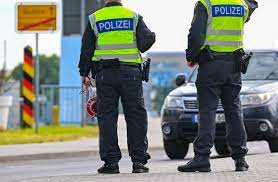BERLIN (AFP): Germany said Wednesday it would step up policing of its borders with Poland and the Czech Republic, in a bid to get a grip on rising levels of illegal migration.
Federal police would “carry out additional flexible, targeted controls on the (people) smuggling routes” along its eastern border, Interior Minister Nancy Faeser told journalists.
The surge in arrivals has reignited the immigration debate in Germany, put pressure on Chancellor Olaf Scholz’s government and caused tensions with European neighbours facing their own influx.
The new controls would be implemented “this week” to reinforce forces already patrolling the border area, Faeser said.
“My goal is to put maximum pressure on smugglers and to protect people,” she said.
Germany has already increased the number of police carrying out search operations in the border area in recent months, as numbers began to rise.
Between January and August this year, federal police detected 70,753 irregular entries into Germany, a nearly 60-percent increase on the same period last year.
The number of requests for asylum also rose by around 77 percent, with over 204,000 applications made, according to the Federal Office for Migration and Refugees.
Faeser recently raised the possibility of implementing fixed controls along the border with Poland and the Czech Republic, a measure already in place along the boundary between Germany and Austria.
All are members of the European Union and of Europe’s Schengen open-borders zone.
The reintroduction of border checks in the Schengen Area is permitted only in exceptional circumstances and must be notified with Brussels before it can be implemented.
– European debate –
Faeser said she did not “rule out” imposing fixed controls in future if the new measures did not prove effective enough.
The moveable controls would not however need to be notified with the European Union, Faeser said.
She had received the necessary go-ahead from her Czech counterpart and said she hoped to get the same approval from Poland at a meeting of European interior ministers in Brussels on Thursday.
Immigration will be at the top of the agenda for the talks, as member states wrangle over who has responsibility for new arrivals and how to better insulate the EU’s borders.
“I am very optimistic that we will reach an agreement shortly, because everyone involved is aware of how important a European solution is,” Faeser said.
The issue has been driven in particular by Italy, which has seen a surge in the number of people arriving on boats from North Africa.
The relationship between Germany and Prime Minister Giorgia Meloni’s government has frayed over the issue.
Rome has denounced Germany for its support for migrant charities helping rescue those attempting the crossing. Berlin has likewise suspended an agreement to take migrants from Italy.
– Memories of crisis –
In Germany, the rising number of arrivals has brought back memories of the 2015 migrant crisis, when tens of thousands of people streamed into the country.
Then Chancellor Angela Merkel kept borders open, calling on Germany to manage the influx of refugees mostly from Syria and Iraq.
While nowhere near the peak seen in 2015, the increase in migrants has reignited the debate on immigration in Germany.
In a recent cover, German news magazine Spiegel asked “can we do it again?”, echoing Merkel’s rallying cry at the height of the 2015 crisis.
Germany had “partially lost control over access” to the country during the 2015 crisis, Finance Minister Christian Lindner told the Bundestag Wednesday, saying it could not afford a repeat.
In addition to Faeser’s newly announced controls, Lindner offered to supply 500 customs officials to boost border security.
The opposition was also pressuring Scholz’s government to tamp down the issue.
On Sunday, Michael Kretschmer, the leader of Saxony, one of Germany’s federal states, called for an immediate response, including the implementation of fixed controls.
“The situation is dramatic,” said Kretschmer, a member of the opposition conservatives. Saxony borders both Poland and the Czech Republic.







